Answers
Does p refer to products after into keyword?
The p in the from clause is a new local variable referring to a single product of one category.
Is ps the group of product objects? I mean a sequence of sequences.
Yes, ps is the group of products for the category c. But it is not a sequence of sequences, just a simple IEnumerable<Product>, just like c is a single category, not all categories in the group join.
In the query you only see data for one result row, never the whole group join result. Look at the final select, it prints one category and one product it joined with. That product comes from the ps group of product that one category joined with.
The query then does the walking over all categories and all their groups of products.
If DefaultIfEmpty() isn't used, doesn't p, from p in ps.DefaultIfEmpty(), run into select? Why?
It is not equal to a Select, because the from clause creates a new join with itself, which turns into SelectMany.
Structure
Taking the query by parts, first the group join:
from c in categories
join p in products on c equals p.Category into ps
After this only c and ps are usable, representing a category and its joined products.
Now note that the whole query is in the same form as:
from car in Cars
from passenger in car.Passengers
select (car, passenger)
Which joins Cars with its own Passengers using Cars.SelectMany(car => car.Passengers, (car, passenger) => (car, passenger));
So in your query
from group_join_result into ps
from p in ps.DefaultIfEmpty()
creates a new join of the previous group join result with its own data (lists of grouped products) ran through DefaultIfEmpty using SelectMany.
Conclusion
In the end the complexity is in the Linq query and not the DefaultIfEmpty method. The method is simply explained on the MSDN page i posted in comment. It simply turns a collection with no elements into collection that has 1 element, which is either the default() value or the supplied value.
Compiled source
This is approximately the C# code the query gets compiled to:
//Pairs of: (category, the products that joined with the category)
IEnumerable<(string category, IEnumerable<Product> groupedProducts)> groupJoinData = Enumerable.GroupJoin(
categories,
products,
(string c) => c,
(Product p) => p.Category,
(string c, IEnumerable<Product> ps) => (c, ps)
);
//Flattening of the pair collection, calling DefaultIfEmpty on each joined group of products
IEnumerable<(string Category, string ProductName)> q = groupJoinData.SelectMany(
catProdsPair => catProdsPair.groupedProducts.DefaultIfEmpty(),
(catProdsPair, p) => (catProdsPair.category, (p == null) ? "(No products)" : p.ProductName)
);
Done with the help of ILSpy using C# 8.0 view.

